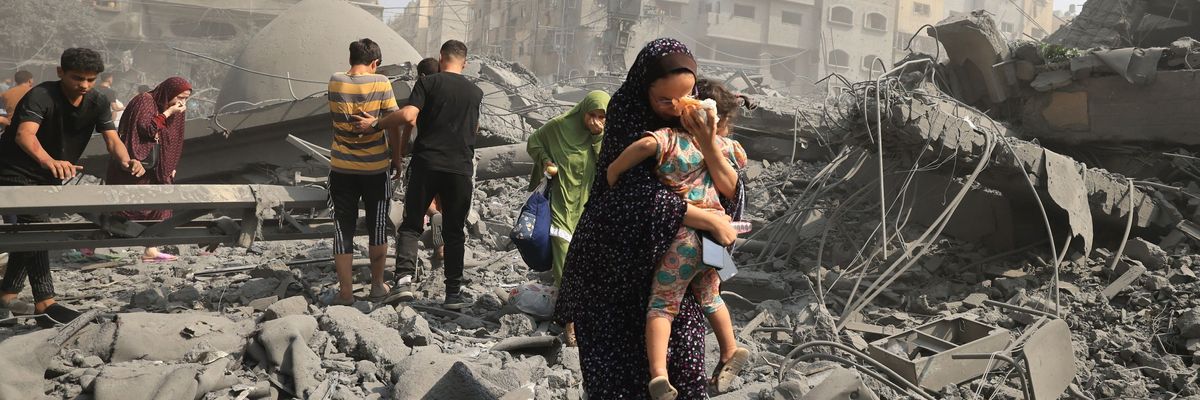Clean water is
running out, hospitals are overwhelmed by thousands of airstrike victims, more than a million people have been displaced, and thousands have been killed, but Israel's ambassador to the United Kingdom refused on Monday to even acknowledge that a humanitarian disaster is underway in the occupied Gaza Strip.
Asked during a
Sky News appearance about her view of the Gaza crisis, Israeli diplomat Tzipi Hotovely said that "there is no humanitarian crisis."
Pressed by anchor Kay Burley to explain what, then, is happening on the ground in the besieged enclave, Hotovely replied, "There is a war in Gaza, a war that Hamas started by committing a horrible massacre on innocent Israelis."
Hotovely went on to claim that Israel is trying to prevent the deaths of innocent Gazans, even as the country's military heavily bombs civilian areas—damaging and destroying hospitals, schools, mosques, and residential buildings—and
refuses to agree to a cease-fire to let people escape the enclave.
Matt Duss, executive vice president of the Center for International Policy, called Hotovely's denial of a humanitarian crisis in Gaza "pure gaslighting."
"Not only is there a humanitarian crisis, Israeli security officials have warned for years that failure to address it could lead to exactly what we’re seeing now," Duss wrote on social media. "Tragically, Israeli (and U.S. and E.U.) politicians chose not to listen. And here we are."
The Israeli diplomat's remarks came shortly after Philippe Lazzarini, commissioner-general of the United Nations Relief and Works Agency for Palestine Refugees in the Near East (UNRWA),
warned that "an unprecedented humanitarian catastrophe is unfolding under our eyes" as Gaza remains under complete siege and near-constant bombardment.
"As of today, my UNRWA colleagues in Gaza are no longer able to provide humanitarian assistance," Lazzarini said Sunday. "As I speak with you, Gaza is running out of water and electricity. In fact, Gaza is being strangled and it seems that the world right now has lost its humanity. If we look at the issue of water—we all know water is life—Gaza is running out of water, and Gaza is running out of life. Soon, I believe, with this there will be no food or medicine either."
Martin Griffiths, the U.N.'s emergency relief coordinator,
said Sunday that he has been involved in talks with officials in Israel, Gaza, and Egypt about ways to ensure that aid can safely enter the occupied strip. Last week, Israel announced a total blockade of Gaza, refusing to allow food, fuel, or supplies to enter the enclave and cutting off its electricity.
"History is watching to see if the consequences of this war are going to be generationally bad or if there are going to be ways in which swiftly that can be rebuilt, some kind of comity or neighborliness between those two tragic peoples," said Griffiths.
The World Health Organization (WHO)
said Monday that Gaza has just "24 hours of water, electricity, and fuel left," and a "real catastrophe" will result if aid is not immediately allowed to enter the territory. Human rights groups have called the blockade a form of collective punishment, which is a war crime.
U.N. Secretary-General António Guterres said in a
statement Sunday that the United Nations "has stocks available of food, water, non-food items, medical supplies, and fuel, located in Egypt, Jordan, the West Bank, and Israel," but Israel's blockade has prevented their delivery.
"Rapid and unimpeded access for humanitarian aid must be granted for humanitarian supplies and workers for the sake of the civilians in Gaza," Guterres said. "Gaza is running out of water, electricity, and other essential supplies."
Israel's blockade and bombing campaign have been disastrous for Gaza's hospitals, several of which have been forced to shut down due to airstrike damage. The WHO
said Sunday that 21 of Gaza's hospitals have received instructions from Israeli forces to evacuate, part of a broader Israeli evacuation directive aimed at the entire population of northern Gaza.
"Hospital directors and health workers are now facing an agonizing choice: abandon critically ill patients amid a bombing campaign, put their own lives at risk while remaining on-site to treat patients, or endanger their patients' lives while attempting to transport them to facilities that have no capacity to receive them," the WHO said over the weekend. "Overwhelmingly, caregivers have chosen to stay behind, and honor their oaths as health professionals to 'do no harm,' rather than risk moving their critically ill patients during evacuations. Health workers should never have to make such impossible choices."
This story has been updated to include a comment from Matt Duss of the Center for International Policy.

